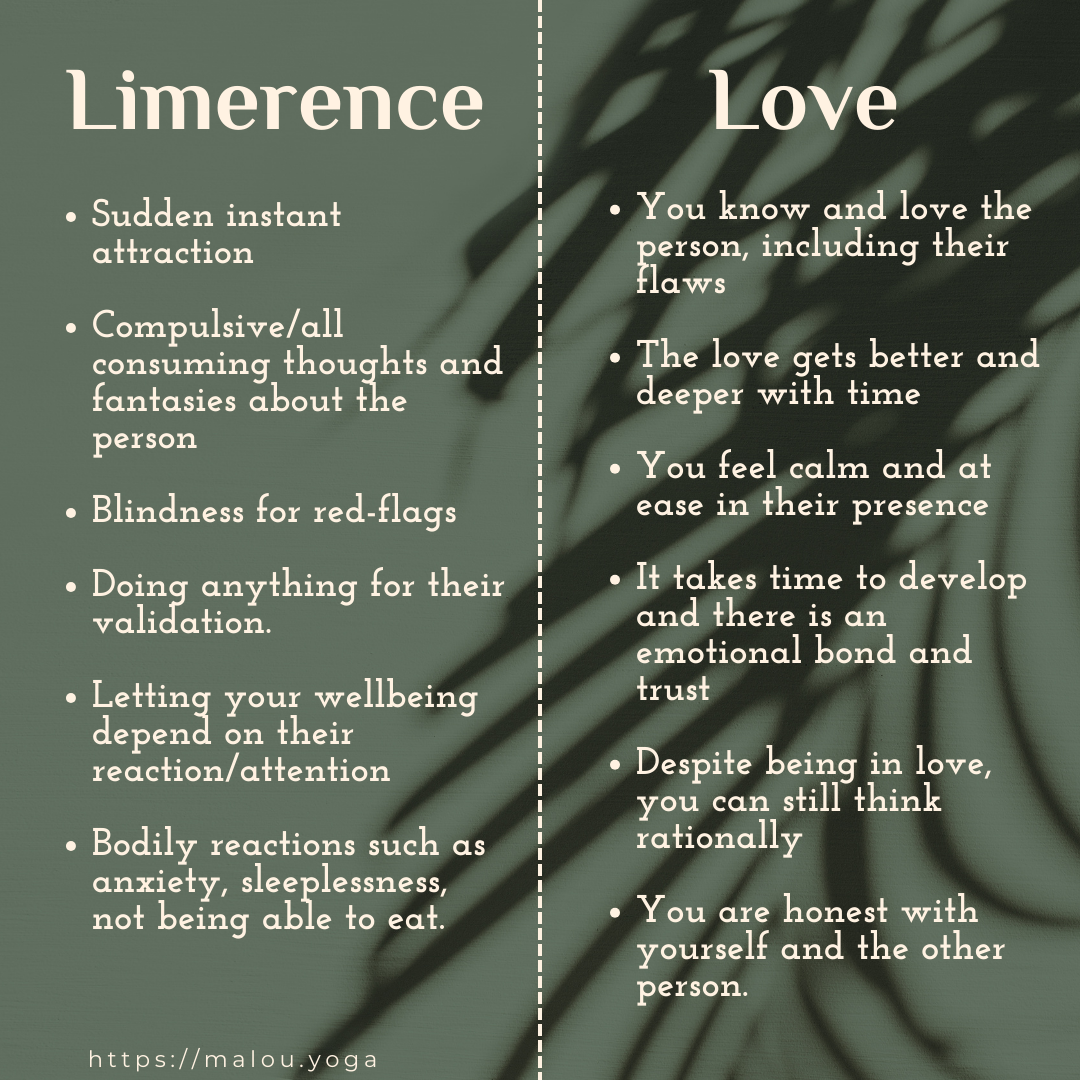
Self-Sabotage: Causes, Signs & How to Stop Self-Destructive Behavior
Learn about self-sabotaging behavior, why it happens, common signs, and practical strategies to break unhealthy patterns and achieve positive growth. Dive into trauma, limiting beliefs, perfectionism, and mental health connections—all in one guide.

Limerence: The Love Drug You Didn’t Know You Were On
Discover the truth about limerence—the addictive illusion of love that fuels obsession, fantasy, and heartbreak. Learn how to break free and heal. Limerence tricks you into believing you only shine when someone else sees you. But you’ve been the light all along.
:max_bytes(150000):strip_icc():format(webp)/bpd-and-adhd-5209597_final-5aac26493f494c898a0bbf4475630ccd.jpg)
Can Someone with BPD Have a Healthy Relationship? Tips for Building Strong Connections
Discover how borderline personality disorder (BPD) affects relationships and learn practical strategies for building healthy romantic, family, and friendship connections. Explore expert advice on communication, boundaries, self-care, and therapy for individuals with BPD and their loved ones.

Navigating the Narcissistic Relationship Journey
This article outlines the predictable cycle of narcissistic relationships, emphasizing the transactional nature rooted in narcissistic personality disorder traits. Narcissists lack empathy and struggle with boundaries, leading to self-centered behavior that disregards the impact on their partners.

Ensnared by Love's Fireworks: Love Bombing Unveiled
The experience of love bombing can elicit feelings of immense joy and euphoria. The generous display of attention and care appears to fulfill our desires. We have encountered an individual whom we believed to be our ideal romantic partner, unaware that this individual had narcissistic tendencies and has specifically chosen us as a target.

Shifting Realities: Unveiling the Harmful Impact of Cognitive Distortions
When engaged in a dispute, couples often encounter difficulties in reaching a consensus over the objective details of the events in question. Furthermore, the human mind has a tendency to deceive itself based on its thoughts, beliefs, and emotions.

What Is Self-Care?
What lights your soul on fire? Dive into your passions and interests with gusto. Whether it's painting, dancing, writing, or gardening, make time for activities that ignite your creativity and bring you joy.

Support Groups for Narcissistic Abuse
Narcissistic abuse can take many forms, including verbal abuse, emotional manipulation, financial abuse, and even physical violence. It can have a significant impact on the victim's mental health, self-esteem, and overall well-being.

Could You Be Avoiding Love
Love addiction doesn't merely involve a desire for companionship; it's a craving, a need for romantic involvement to achieve a sense of being whole. Both men and women ensnared in this web often endure toxic bonds, enduring pain and destruction rather than embracing solitude.

How to Identify Needs and Values
Consider Your Passions: Think about the activities, hobbies, and interests that bring you joy and contentment. What makes your heart beat faster? What motivates and excites you? These interests frequently correlate with your basic values and might provide useful insights into what is genuinely important to you.

Decoding the Impact of Emotional Abuse
This intricate web of maltreatment, encompassing mental, psychological, verbal, and financial dimensions, unfolds in various guises—from explicit verbal attacks to the cunning subtleties of passive-aggressive tactics.

Workaholic Support Group
Workaholism can be a deceptive trap, disguising itself as dedication and ambition. But deep down, it can stem from a need for validation or an escape from personal challenges. Don't let work consume your entire identity. Take action today to regain control and find fulfillment beyond the confines of your job.

Breaking Away from The Love Avoidant
Love avoidance can be a deeply ingrained pattern of behavior that stems from past pain and fear. But it doesn't have to define your future. Take the first step towards change by reaching out for support.

The Effects of Codependency
Codependence is a disease that deteriorates the souls. It affects our personal lives; our families, children, friends, and relatives; our businesses and careers; our health; and our spiritual growth. It is debilitating and, if left untreated, causes us to become more destructive to ourselves and others.

Understanding Codependency — And Why It Matters
Codependency is a common relationship pattern often linked to anxiety, substance use, addiction, and other mental health struggles. But what does it really mean — and is it always harmful?

Attachment styles refer to the way...
Attachment styles refer to the way individuals develop patterns of relating to others, particularly in close relationships such as romantic relationships or parent-child relationships

What Is Codependence
Codependence is a disease that deteriorates the souls. It affects our personal lives; our families, children, friends, and relatives; our businesses and careers; our health; and our spiritual growth.

Anxious-Preoccupied Attachment
Anxious-preoccupied attachment style is characterized by individuals who have a negative view of themselves but a positive view of others, and who seek constant validation and reassurance in relationships.

Healing a Dismissive Avoidant Attachment Style
If you have a dismissive avoidant attachment style, you might value independence and self-sufficiency—it’s what feels safe and familiar.

Healing Childhood Wounds
Acknowledge the Impact: Take a moment to acknowledge the profound impact that your childhood experiences have had on your life. Recognize that these wounds have shaped your beliefs, behaviors, and relationships.

What's Emotional Addiction - Love Addiction
The power of emotions is immense. Your ability for productivity, self-care, and good relationships can be increased by effectively managing and integrating emotional processes with cognitive processes like logic and reason. Due to the fact that emotions are merely the product of our ancestors' instincts, they can often override reason and sensible concerns, causing us to ignore consequences.

Secure Attachment Style
Secure attachment style is characterized by individuals who have a positive view of themselves and others, and who are comfortable with intimacy and emotional expression.

Gaslighting Narcissistic Trait
Are you questioning your own reality and feeling trapped in a web of confusion and self-doubt? Gaslighting is a manipulative tactic that can leave you feeling powerless and disconnected from your own truth. It's time to reclaim your sense of self and break free from the grip of gaslighting.

Dating Plan for Codependents in Recovery | Build Healthy Relationships After Healing
A mindful dating plan for individuals recovering from codependency—focused on healing, healthy boundaries, and authentic relationships.

Your First CoDA Meeting: What to Expect at a Co-Dependents Anonymous Gathering
Learn what happens at your first CoDA meeting. This guide covers the anonymous sharing format, what newcomers can expect, and how to start your journey in Co-Dependents Anonymous.

CoDA Compliance Patterns - Codameetings.com
Discover the most common traits of codependents, including extreme loyalty, fear of rejection, compromised values, and difficulty expressing personal needs. Learn how these behaviors impact relationships and emotional well-being.

Zoom Invite
Like with Alcoholics' Anonymous' 12 Step Program, CODA (Co-Dependents Anonymous) has 12 Promises. They also have ways to recognize when you have a problem with your relationship.

The 12 Steps of Co-Dependents Anonymous (CoDA) for Recovery
Explore the 12 Steps of Co-Dependents Anonymous, a spiritual path to healing from codependency. Learn how these steps support recovery, personal growth, and emotional freedom through self-reflection and connection.

CoDA Low Self-Esteem Patterns - Codameetings.com
Have difficulty making decisions. Judge what they think, say, or do harshly, as never good enough. Are embarrassed to receive recognition, praise, or gifts. Value others’ approval of their thinking, feelings, and behavior over their own. Do not perceive themselves as lovable or worthwhile persons. Seek recognition and praise to overcome feeling less than. Have difficulty admitting a mistake.

